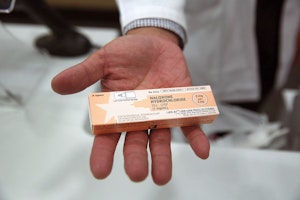Macedonia’s Lessons for Fighting HIV
By Andrej Senih

Earlier this year, advocates for people in Macedonia living with HIV showed why civil society activism is crucial when it comes to helping countries develop sustainable ways to fund treatment and prevention. Our progress on this front sends a crucial message for people living with HIV in other countries wrestling with this challenge—and to international funders who can help make the difference between success and failure in the fight to end HIV/AIDS in countries like Macedonia.
Although Macedonia’s HIV epidemic is relatively small, it’s growing fast: from 2015 to 2017, there was an almost 60 percent increase in the number of cases diagnosed. While HIV transmission is rising, treatment enrollment is not keeping pace: by mid-2017, only about half of the estimated number of people living with HIV were receiving treatment. And Macedonia is confronting this surge just as it is losing a key source of financial support for HIV response—grants from the Global Fund to Fight AIDS, Tuberculosis, and Malaria.
The Global Fund was created back in 2002 to coordinate public and private funding to countries that need external support to combat these epidemics. But now it’s withdrawing from middle-income countries with relatively small epidemics—a category that includes not only Macedonia but Serbia, Bulgaria, Ukraine, Jordan, Lebanon, and others.
About $25 million in Global Fund grants helped Macedonia dramatically expand its HIV response from 2005 onwards. In addition to supporting government-run HIV programs, these grants also provided crucial funding for NGOs that work with high-risk populations.
This intervention is key to the Global Fund’s success because these populations—like men who have sex with men, people who use drugs, and sex workers—are often marginalized. They lack the political influence to sway budget decisions, and governments can be hesitant to fund the harm reduction services they need. Global Fund support allowed NGOs run by and for these communities to offer services like needle and syringe exchange, HIV testing and counseling, and safer sex education, which slowed the spread of the epidemic.
With its final grant scheduled to run out in June of this year, Macedonia had to plan a way to take responsibility for funding HIV response on its own. That’s where we come in: three years ago, 16 Macedonian civil society organizations united to create a joint platform to advocate for sustainable financing of HIV programs.
When the Ministry of Health cut the budget for these services last year, we were quick to respond—first by appealing to the ministry and members of parliament and then, when those talks stalled, through overt activism. We organized a series of public protests and other actions and won unprecedented media attention [link in Macedonian] to this issue in the months leading up to the December 2016 elections. As a result, 13 political parties signed a declaration promising to ensure adequate funding for the National HIV Program and to include civil society in the process.
This show of political will was a victory—but it wasn’t a guarantee, especially given the instability Macedonia experienced next. With no functioning government in place for the first six months of 2017, the process of implementing these commitments stumbled. A four-month funding interruption from June to September had harsh consequences for NGOs.
For example, Equality for Gays and Lesbians (EGAL), which runs several drop-in centers offering HIV testing and counseling, had to close a center in Shuto Orizari—the country’s only Roma-majority municipality. This was a double blow for the hundreds of men who had relied on the service, since the Roma community already experiences higher barriers to accessing health care. EGAL’s outreach team, which provides safer sex education and condom distribution, dwindled from six staff members to one.
Other NGOs also lost trained staff—and with them, valuable expertise—or had to rely on unpaid volunteers. Reports from other countries losing Global Fund support, like Serbia and Bulgaria, tell a similar story of service disruptions, loss of human capital, and rising HIV rates, as NGOs on the front line of the HIV response struggle to keep their doors open.
Macedonia’s experience highlights the need for external donors to step in and help countries facing Global Fund withdrawal—both to help them plan for sustainable ways to pay for HIV treatment and prevention in the future, and to keep service providers afloat if obstacles arise. Fortunately, international foundations provided funding to our civil society platform last year that helped us stay engaged in the process and lay the groundwork for success.
When Macedonia’s new government finally took office in June, both the new prime minister and the minister of health promised to fulfill the pledge made last December. In September, the government announced it would allocate $1.84 million to the National HIV Program for 2018, and establish a system for government contracting to civil society organizations that provide HIV services. A pilot system is now in place, and the projects that lost funding will hopefully be restored soon.
While there’s still work to do, we are well on our way to ensuring that Macedonia has the resources necessary to tackle our HIV epidemic. If other countries facing the same challenges can learn from our experience, they may be able to avoid the spike in HIV transmission we’ve seen here. And if international donors want to help prevent this from happening again, they should take action to support civil society in countries that the Global Fund is leaving behind.
The Health Education and Research Association and the Stronger Together Association for Support of People Living with HIV, two members of the Macedonian Civil Society Platform for Sustainability of HIV Prevention and Support Programs, are grantees of the Open Society Foundations.
Andrej Senih is the advocacy coordinator for the Macedonian Civil Society Platform for Sustainability of HIV Prevention and Support Programs.


